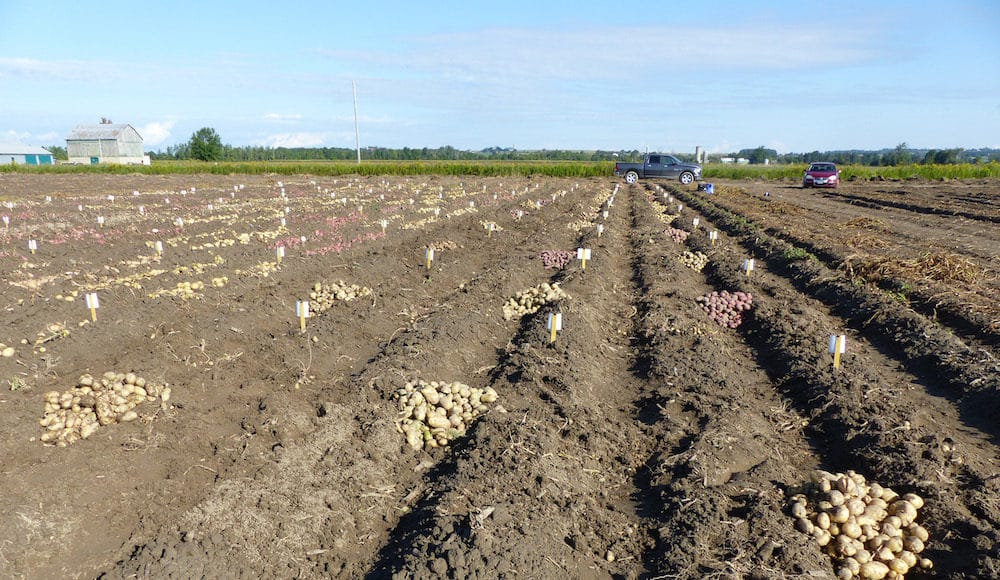Ed. note: On Sept. 4, 2017, Eugenia Banks, potato specialist with the Ontario Potato Board, dug up the Beeton (Ontario) Variety Trial plot that was embedded in a grower’s field. These are her observations:

The flooding that occurred on June 23, as a result of a five-inch rain, kept the plants under water for 30 hours. I expected a total loss. However the grower worked hard to save my plot and the water was diverted to a ditch. This allowed the plants to get the much needed oxygen. After June 23, it kept raining in the area, and the plot had water standing between the rows nearly all summer.
The plants grew, but they did not look strong, some were yellowish, others looked a bit wilted. The few times I was able to walk the plot without being stuck in mud, I realized that I had to lower my expectations and just wait and see what was under the hills.
After harvest, I noticed the following problems:
- Many plants grew in clusters, tubers were produced very close to the stems and near the soil surface trying to get more oxygen. This caused lots of greening.
- Many knobby, off-shaped tubers were produced.
- Hollow heart was bad on susceptible varieties like the standard Yukon Gold. (Boron had been applied to reduce hollow heart.)
- I found only a few tubers with Pink Eye, Pink Rot, Pythium, Soft Rot and Blackleg. Not as many as I expected for the wet soil conditions that prevailed all summer long.
- Scab developed as usual. I do not agree with the theory that high soil moisture for three weeks after tuber initiation reduces common scab incidence.
- Yield was poor, less than half of the expected yield.
Positive observations:
- I used whole seed for most of the varieties and Sta-Dry for seed pieces. The seed pieces had suberized when I planted the plot. Whole seed is more resistant to saturated soil stress, or any other stress, than seed pieces. Also, I planted minitubers of 15 varieties; they tolerated the stress very well, and produced large tubers with smooth skin. Briosa, a yellow fleshed variety with pink eyes, look promising.
- A clone for the red-skinned creamers’ market looked impressive.
- Two russets, Alverstone and Rickey Russet, performed well.
- Late blight did not develop in the plot despite the perfect conditions for the disease. The grower had sprayed the plot before the flooding occurred, and followed a tight fungicide program after June 23. (He was successful in not getting stuck in the mud.)
- Regular applications of Epsom salts probably contributed to the survival of the plot.
- All in all, it was a good trial — it provided the opportunity to asses 100 new varieties/clones under adverse conditions.
Jeroen Bakker, the potato breeder from The Netherlands who came to rate the new HZPC varieties was not disappointed. In general, potato breeders like to see how the clones/varieties perform under unfavourable conditions. That is important information for growers!
On another note, the spore traps in the Alliston and Shelburne areas caught late blight spores from Sept. 4 to Sept 7. I will keep monitoring the late blight spore traps until results are negative.











